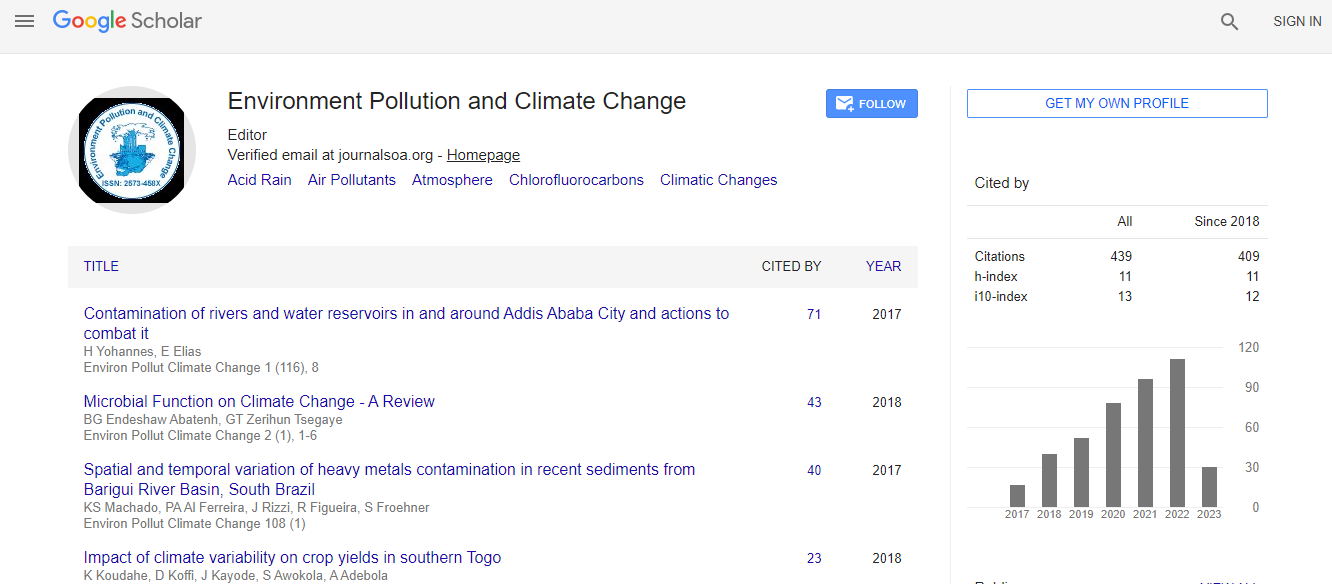Our Group organises 3000+ Global Conferenceseries Events every year across USA, Europe & Asia with support from 1000 more scientific Societies and Publishes 700+ Open Access Journals which contains over 50000 eminent personalities, reputed scientists as editorial board members.
Open Access Journals gaining more Readers and Citations
700 Journals and 15,000,000 Readers Each Journal is getting 25,000+ Readers
Google Scholar citation report
Citations : 672
Environment Pollution and Climate Change received 672 citations as per Google Scholar report
Environment Pollution and Climate Change peer review process verified at publons
Indexed In
- Google Scholar
- Publons
- Euro Pub
- ICMJE
Useful Links
Recommended Journals
Share This Page
Impacts of climate change on large-scale weather driven energy system design decisions for the 21st century
Joint Event on 5th World Conference on Climate Change & 16th Annual Meeting on Environmental Toxicology and Biological Systems
Kozarcanin Smail
Aarhus University, Denmark
ScientificTracks Abstracts: Environ Pollut Climate Change
Abstract
Increasing global warming and the resulting climatic changes are likely to advance the weather-related risks that are facing many different human and natural systems. In the attempt to cushion these effects, mitigation strategies that rely on lowcost weather driven variable renewable energy technologies are gaining ground, and installed renewable energy generation capacities are increasing significantly. We present a study on, to what extend the weather is changing in a way that also directly impacts the best system design decisions for weather-driven sustainable energy systems. The latest generation of IPCC’s climate projections, RCP2.6, RCP4.5 and RCP8.5, have been used to represent a broad range of climate outcomes during the 21st century. These are strongly influenced by climate policies representing the latest Paris agreement, imposition of high global greenhouse gas emission prices and lack of climate policies, respectively. On behalf of the EURO-CORDEX project, three hourly climate data have been provided from six different high-resolution regional climate models for Europe. We have then applied state-of-art methods to generate bias corrected wind and solar power production time series for the 21st century, and to correct the electric consumption profiles for heating and cooling for 30 European countries. To assess the far future impacts of climate change, the production and consumption profiles are applied to a fully connected, highly-renewable, largescale European energy system. As a result, we found small changes in the relevant energy system key metrics of the combined system dynamics compared to historical values. We concluded that the effect of climate change can most likely be ignored in the context of energy system design for the 21st century. However, in correspondence with the literature, impacts of climate change are more prominent through the demand and these strongly outweigh the energy supply side impacts. Recent Publications 1. T Brown, D Schlachtberger, A Kies, S Schramm and M Greiner (2018) Synergies of sector coupling and transmission extension in a cost-optimised, highly renewable European energy system, preprint arXiv:1801.05290. 2. J Wohland, M Reyers, J Weber and D Witthaut (2017) More homogeneous wind conditions under strong climate change decrease the potential for inter-state balancing of electricity in Europe. Earth System Dynamics 8.4. 3. I Tobin, et al. (2016) Climate change impacts on the power generation potential of a European mid-century wind farm scenario. Environmental Research Letters 11(3):034013. 4. P Berril, et al. (2016) Environmental impacts of high penetration renewable energy scenarios for Europe. Environmental Research Letters 11(1):014012.Biography
Kozarcanin Smail is passionate in understanding and proposing ways of how the humanity is able to mitigate climate change during the 21st century. This interest has led him to join the Aarhus University, Sustainable Energy System group where he is employed as a PhD Fellow. He has his expertise within the subject of climate change impacts on future highly renewable large scale energy systems.
E-mail: sko@eng.au.dk

 Spanish
Spanish  Chinese
Chinese  Russian
Russian  German
German  French
French  Japanese
Japanese  Portuguese
Portuguese  Hindi
Hindi 
